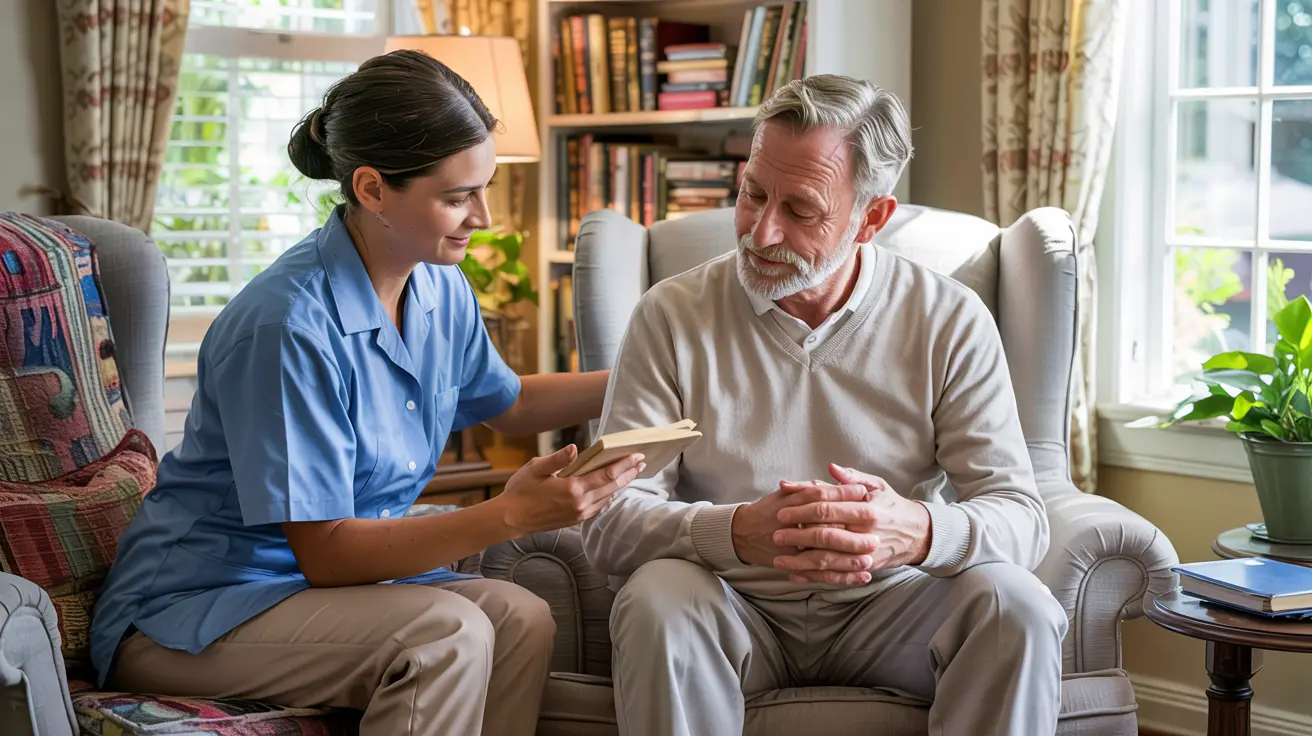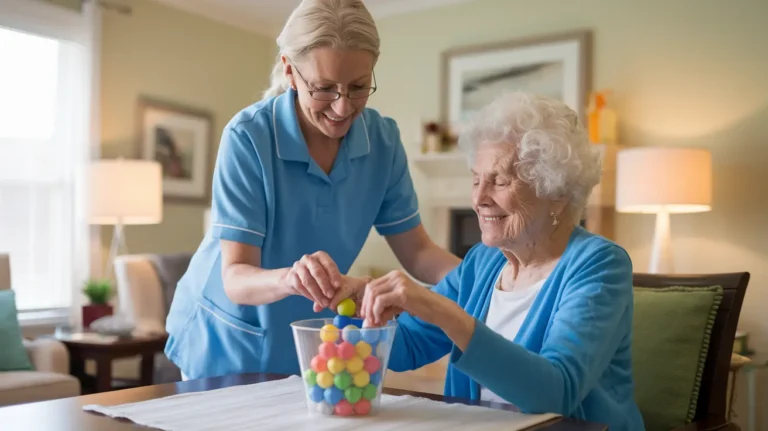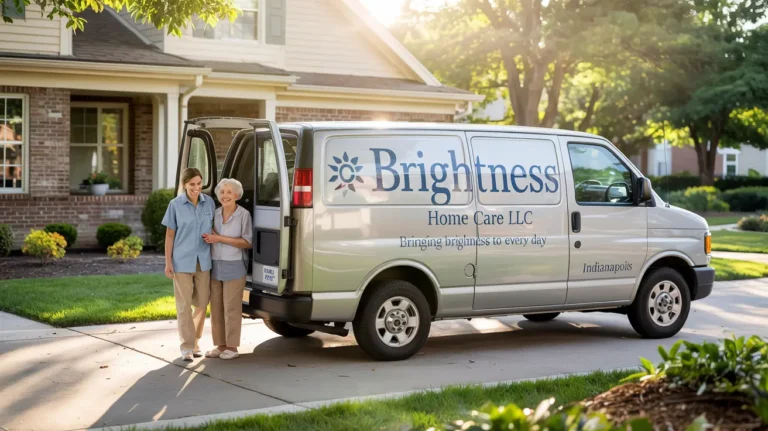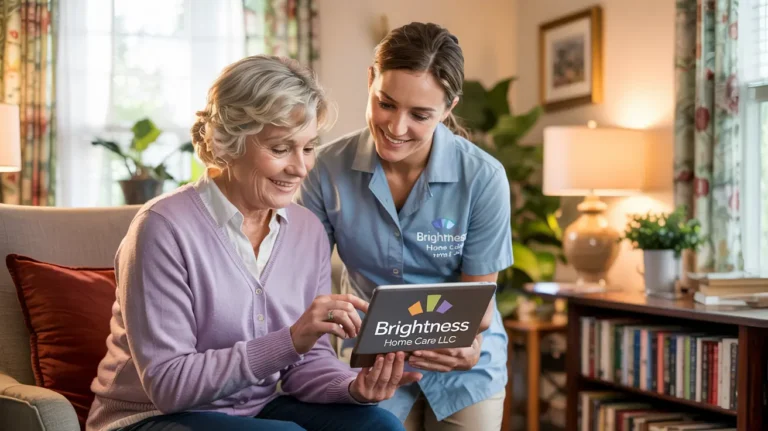Complete Guide to Memory Care Assessment in Indianapolis: What Families Need to Know
Did you know that over 6 million Americans are living with Alzheimer’s disease, and that number is projected to rise dramatically in the coming years? I remember when my own aunt started showing signs of memory issues – we were all confused, scared, and unsure where to turn for help. That’s why I’m passionate about sharing information on memory care assessments.
A memory care assessment is a comprehensive evaluation that helps identify cognitive changes, determine their cause, and create appropriate care plans for individuals experiencing memory difficulties. For families in Indianapolis facing these challenges, getting a proper assessment isn’t just helpful—it’s absolutely essential for ensuring your loved one receives the right care and support.
Brightness Home Care LLC, located at 4911 West 38th Street in Indianapolis, has become a trusted leader in memory care services throughout the Indianapolis area. Their team of compassionate experts specializes in thorough memory assessments that help families understand what’s happening and plan for the future.
In this guide, I’ll walk you through everything you need to know about memory care assessments in Indianapolis—from the basics of what they involve to understanding results and finding the right care solutions for your loved one. Let’s dive in!
Understanding Memory Care Assessment Basics
I still remember how confused I was when I first heard the term “memory care assessment.” Is it just a simple memory test? Does it diagnose Alzheimer’s right away? There’s so much misinformation out there!
A memory care assessment is actually a comprehensive evaluation performed by healthcare professionals to evaluate cognitive function, identify potential memory disorders, and determine the best approach for care and treatment. It’s way more thorough than those quick memory tests you might see online.
You might wonder when it’s time to consider an assessment. Trust me, I ignored the signs with my family member for too long! Watch for things like repeatedly asking the same questions, forgetting important dates or events, struggling with familiar tasks, becoming confused about time or place, or having trouble following conversations. These aren’t just “senior moments”—they might signal something that needs professional attention.
Memory assessments typically evaluate various cognitive conditions, including Alzheimer’s disease, vascular dementia, Lewy body dementia, frontotemporal disorders, and mild cognitive impairment. Each has different characteristics and progression patterns, which is why proper assessment is crucial.
Early detection is honestly one of the most important things! Getting an assessment done sooner rather than later can lead to better management of symptoms, more time to plan for future care needs, and in some cases, treatments that work best when started early. I wish we hadn’t waited so long with my aunt.
People often think memory assessments are just for confirming an Alzheimer’s diagnosis, but that’s not true at all! They also help rule out other conditions that might cause memory problems, like vitamin deficiencies, medication side effects, or depression. Not all memory issues mean dementia, which is why proper assessment matters so much.
The Memory Care Assessment Process in Indianapolis
When I first went through this process with a family member, I had no idea what to expect. Let me walk you through what typically happens during a memory care assessment in Indianapolis so you’re better prepared than I was!
First, you’ll usually start with a referral from a primary care physician, though some services like Brightness Home Care LLC can help arrange an assessment directly. The initial appointment typically involves gathering medical history, discussing observed symptoms, and conducting preliminary screening tests. These first appointments usually take about 1-2 hours—bring water and make sure your loved one is comfortable!
The assessment team usually includes several professionals working together. You might meet with neurologists, geriatricians, neuropsychologists, geriatric psychiatrists, and specialized nurses. At Brightness Home Care LLC, they have certified dementia care specialists who coordinate with medical professionals to ensure comprehensive evaluation.
The actual testing can feel overwhelming, I’m not gonna lie! It typically includes cognitive tests like the Mini-Mental State Examination (MMSE) or Montreal Cognitive Assessment (MoCA), which evaluate memory, attention, language, and problem-solving skills. There might also be laboratory tests to rule out other causes of cognitive changes, brain imaging like MRI or CT scans, functional assessments to evaluate daily living capabilities, and psychiatric evaluations to check for depression or other mental health conditions.
The timeline from initial appointment to diagnosis and care recommendations typically spans 2-4 weeks, depending on the complexity of the situation and how many specialists are involved. It felt like forever when we were going through it, but the thorough approach is worth it.
Brightness Home Care LLC’s approach is particularly personal. They begin with an in-home preliminary assessment that reduces stress for the individual being assessed. Their team coordinates with medical providers and accompanies clients to appointments if needed—this was huge for us since navigating medical facilities can be confusing and stressful for someone with memory issues.
Key Components of a Comprehensive Memory Assessment
A good memory care assessment isn’t just about asking “What day is it?” or “Can you remember these three words?” It’s actually much more thorough! I’ve been through this process with family members, and I was surprised by how detailed it really is.
The cognitive function testing includes evaluations of short and long-term memory (like recalling recent events versus childhood memories), attention span and concentration abilities, executive function skills like planning and organizing, language comprehension and expression, and visuospatial abilities like drawing simple shapes or navigating familiar environments. My uncle struggled most with the clock-drawing test—I never realized how many cognitive skills that simple task required!
Physical health evaluation is crucial too! The assessment should include a complete medical history review, medication evaluation (some meds can affect memory!), neurological examination to check reflexes and coordination, and sensory assessments since vision and hearing problems can sometimes be mistaken for cognitive issues. We discovered my aunt’s medication for arthritis was actually contributing to her confusion!
The psychological component looks at mood disorders like depression and anxiety that can masquerade as dementia or make symptoms worse. They’ll evaluate emotional well-being, screen for psychiatric conditions, and assess stress levels that might impact cognitive function. Sometimes improving mental health can significantly improve cognitive symptoms!
Daily living activities assessment examines how memory issues affect everyday life—can they manage medications independently? Cook safely? Handle finances? Drive? This practical evaluation really helped us understand what specific help was needed day-to-day.
Family interviews are super important too! Caregivers and family members provide crucial information about changes in behavior, personality, and abilities over time. Sometimes we notice things the person themselves doesn’t realize are happening. They’ll also collect family medical history since many memory conditions have genetic components.
Environmental safety considerations include home safety evaluations to identify potential hazards and recommend modifications. This was eye-opening for us—we never realized how many trip hazards and confusing elements existed in my aunt’s home until the assessment pointed them out!
Interpreting Memory Care Assessment Results
Getting the results of a memory assessment can feel overwhelming—trust me, I’ve been there! Understanding what all those numbers and terms mean makes a huge difference in making good care decisions.
Most cognitive assessments use standardized scoring systems like the MMSE (scores range from 0-30) or MoCA (scores range from 0-30). Generally, higher scores indicate better cognitive function. For example, an MMSE score above 24 generally indicates normal cognition, while scores below suggest varying degrees of impairment. But these are just numbers—the interpretation by specialists is what really matters!
Different diagnoses have different implications. Alzheimer’s disease typically progresses gradually over years and affects memory prominently. Vascular dementia often has a more “stepped” progression related to small strokes. Lewy body dementia includes physical symptoms like tremors alongside memory issues. Mild cognitive impairment means changes are noticeable but don’t significantly impair daily functioning yet. Each requires different approaches to care!
Assessment results should directly inform care recommendations. The team might suggest medications that can help manage symptoms, therapy programs like cognitive rehabilitation or occupational therapy, safety measures for the home environment, or specific types of supportive care services. Brightness Home Care LLC excels at translating assessment findings into practical, personalized care plans.
Discussing results with family can be emotional—I definitely cried during our family meeting. Good providers present information clearly but compassionately, allow time for questions, include the diagnosed individual appropriately in conversations, and provide written summaries to review later when emotions aren’t running so high.
The assessment should culminate in a clear action plan that outlines immediate next steps, recommended treatments or interventions, referrals to specialists if needed, community resources that might help, and a timeline for follow-up assessments to monitor changes. Having this roadmap made such a difference for our family—it turned a scary diagnosis into manageable steps forward.
Memory Care Options Following Assessment in Indianapolis
After getting assessment results, the big question becomes: “Now what?” Indianapolis actually offers several good options, and I’ve explored most of them while helping different family members over the years.
In-home memory care services can be ideal for those in early to moderate stages who want to remain in familiar surroundings. Services typically include personal care assistance, medication management, cognitive engagement activities, light housekeeping, and respite for family caregivers. Brightness Home Care LLC offers specialized in-home memory care with staff specifically trained in dementia care techniques. Their personalized approach means they can adapt services as needs change—which is so important because memory conditions rarely stay static.
Indianapolis has several specialized memory care facilities with secure environments, structured routines, and staff trained in dementia care. These vary from dedicated memory care communities to specialized wings within assisted living facilities. The monthly costs typically range from $5,000 to $7,000 depending on level of care needed. While touring facilities, I learned to look beyond the fancy lobbies and ask specific questions about staff training and turnover rates!
Adult day programs provide cognitive stimulation, social interaction, and supervised activities during daytime hours while allowing the person to return home in evenings. These cost around $50-100 per day and can be a fantastic “middle ground” option. We used one of these for my uncle, and it helped maintain his social connections while giving my aunt some much-needed respite time.
Brightness Home Care LLC really shines in how they tailor services to assessment results. Their care plans aren’t one-size-fits-all—they consider the specific type and stage of cognitive impairment, remaining strengths to build upon, personal preferences and history, and family dynamics. They also coordinate seamlessly with other providers like physicians and therapists. Their “aging in place” philosophy helped my neighbor stay in her home much longer than would otherwise have been possible.
Cost is obviously a big consideration. Medicare typically covers the medical components of memory assessments but has limited coverage for ongoing care. Long-term care insurance may cover some services depending on the policy. Indiana’s Medicaid waiver programs can help eligible individuals access care services. Veterans benefits might also apply. Brightness Home Care LLC offers free consultations to help families understand payment options and often identifies benefits families didn’t realize they qualified for!
Supporting Loved Ones Through the Assessment Process
The assessment process can be emotionally challenging for everyone involved. I’ve been on both sides—supporting family members and later needing support myself when helping my mom.
When preparing for a memory assessment, try to schedule appointments during the person’s best time of day (usually morning for many people with memory issues). Bring a complete list of current medications, a journal of observed symptoms or incidents, and copies of relevant medical records. Make sure they wear comfortable clothes and bring their glasses or hearing aids! I always bring a bottle of water and a small snack too—these appointments can run long.
Talking about the need for assessment requires sensitivity. Approach the conversation calmly without multiple family members that might feel overwhelming. Focus on the benefits—”This will help us understand how to support you better” rather than pointing out mistakes or failures. Listen to their concerns—many people fear a dementia diagnosis and what it might mean for their independence. If resistance continues, sometimes having the recommendation come from a trusted doctor can help.
The emotional impact of diagnosis is real and varies widely. Some people feel relief at having an explanation for symptoms, while others experience grief, anger, fear, or denial. Allow space for these emotions without trying to “fix” them immediately. I remember my dad just needed to sit quietly for several days after my mom’s diagnosis—everyone processes differently.
Building a support network is crucial! This includes healthcare providers, family members, friends, support groups, and community resources. The Alzheimer’s Association Greater Indiana Chapter offers excellent support groups and educational programs. Joy’s House and CareAware provide valuable resources for family caregivers. Don’t try to handle everything alone—I made that mistake and ended up exhausted.
Indianapolis has some fantastic resources! The Indiana Alzheimer’s Disease Research Center provides educational materials and research opportunities. CICOA Aging & In-Home Solutions offers care management services and resources for older adults and family caregivers. The Alzheimer’s Association 24/7 Helpline (800-272-3900) provides information and support anytime. And of course, Brightness Home Care LLC offers specialized memory care services and valuable guidance throughout the journey.
How Brightness Home Care LLC Excels in Memory Care
Through my personal and professional experiences with various providers in Indianapolis, I’ve come to appreciate what sets certain organizations apart. Brightness Home Care LLC has established itself as a leader in memory care services for several important reasons.
Their staff undergoes extensive specialized training that goes well beyond basic certification requirements. All caregivers complete dementia care certification programs and receive ongoing education in the latest evidence-based approaches. They also participate in experiential training that simulates the challenges of living with dementia—this creates remarkable empathy in their caregiving approach. I’ve noticed their staff doesn’t get frustrated with repetitive questions the way some other providers did with my aunt.
Their personalized approach really stands out. They begin with a comprehensive assessment that considers not just cognitive status but personal history, preferences, cultural background, and established routines. Care plans incorporate preserved abilities and interests rather than focusing solely on deficits. Their “life story” approach means caregivers know what topics engage each client—I was amazed when a caregiver connected with my typically non-verbal neighbor through discussions about her former career as a teacher!
They’ve achieved impressive results for many families. One client experienced significant reduction in sundowning behaviors through their specialized evening routine program. Another family was able to delay facility placement by over two years through their adaptive home care approach. They’ve helped numerous clients decrease medication needs through non-pharmacological approaches to behavior management.
Their specialized programs include cognitive stimulation activities tailored to ability level, validation therapy techniques that respect the client’s emotional reality, sensory engagement activities for those in advanced stages, and specialized communication approaches like “memory books” and visual cuing systems.
Being locally based in Indianapolis gives them unique advantages. They understand Indianapolis neighborhoods and can help clients safely navigate familiar surroundings. They’re familiar with local healthcare systems and can coordinate effectively with area physicians. They know which community resources complement their services and can make appropriate referrals. Their deep community roots mean they often have existing relationships with other providers in a client’s care network.
The Journey Through Memory Care Assessment: Moving Forward with Confidence
Going through a memory care assessment can feel overwhelming, but it’s truly the first step toward better care and quality of life. I’ve walked this path with several family members now, and while it’s never easy, having the right information and support makes all the difference.
Remember that early assessment leads to better outcomes! Many conditions benefit from prompt intervention, and even when that’s not possible, early planning helps families make thoughtful decisions rather than crisis-driven ones. The comprehensive approach used by quality providers like Brightness Home Care LLC ensures that no aspect of care is overlooked.
Every person’s journey with memory challenges is unique. Some thrive with in-home support, while others do better in specialized environments. The key is making informed decisions based on thorough assessment results rather than assumptions or fears. Be open to adjusting plans as needs change—flexibility is essential in memory care.
Safety considerations should always be paramount, whether considering medication management, driving privileges, home modifications, or supervision needs. Having these evaluated professionally provides peace of mind and concrete action steps.
If you’re noticing memory changes in yourself or a loved one, don’t wait to seek help. Brightness Home Care LLC at 4911 West 38th Street in Indianapolis offers confidential consultations and can guide you through the assessment process with compassion and expertise. Their team understands both the practical and emotional dimensions of memory care and can help your family navigate this journey with dignity and respect.
I’d love to hear your experiences with memory assessments or any questions you might have! Every family’s story helps others feel less alone in this journey. What challenges have you faced, or what resources have you found helpful in Indianapolis?







